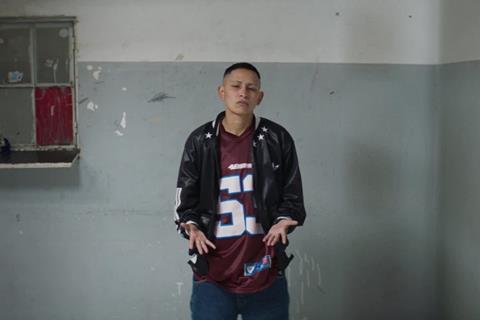A sensitive and subtle exploration of Latin American masculinity on the streets of Bogota

Dir/scr: Fabian Hernández. Colombia/France/The Netherlands/Germany. 2022. 82 mins.
A homeless teen in Bogota struggles to find his place in the world in A Male, which juxtaposes the insecurities of its protagonist with the rigid and often brutal machista codes that prevail on the streets. Smart, sensitive and thoroughly contemporary in its concerns, Fabian Hernández’s feature debut nonetheless feels dramatically inert through large stretches, its insistence on low-key authenticity meaning that dynamism — generally a given in Latin American street dramas — is sacrificed. But for its often subtle exploration of the hidden damage that stereotyping can wreak on the lives of young men, A Male deserves further festival exposure.
This is all about radical Latin American versions of masculinity, from which the values of tenderness and sensitivity have been entirely erased.
A Male can be seen as a kind of companion piece to another Critics’ Week player, Andrés Ramírez Pulido’s La Jauría, which offers an equally sceptical view of the codes of masculinity. We open with three talking heads, residents of a homeless shelter in the Colombian capital, reminding us of the skills it takes to survive on the streets: “you have to stand tough, or you’ll be eaten alive”. But with his androgynous features, skinny body and high voice, 16-year-old Carlos (Dylan Felipe Ramírez Espitia) — also a resident in the shelter — doesn’t fit the bill. His mother, who he misses desperately, is in jail, and his sister Nicole (Juanita Carrillo Ortiz) is turning tricks to raise money to get her out.
Christmas is coming up, and the film, which is not entirely free of sentimentality, doesn’t play down the contrasts between Carlos’ loneliness and the festivities that surround him as he wanders the streets. The marginal barrios of Bogota (the film is based on Hernández’s own observations of them as he was growing up) are indeed tough: practically everyone seems to carry a gun, but strangely, nobody seems to have a phone, and when Carlos calls his mum, it is from a callbox.
Carlos is lucky to be under the protection of Freddy (Jonathan Steven Rodriguez), for whom he sells drugs. With Freddy’s help he goes to a nightclub where he loses his virginity (according to this film, women seem to make themselves freely available to men for this very purpose), but Carlos’ main concern is that his reputation as a man will suffer if things don’t go well.
Going in search of Nicole, he encounters the pistol-wielding psychopath Taverna (Enrique Valencia Garzón), who abuses him verbally, threatens to kill him and steals his shirt and jacket — painful when your clothes are your only possession. The stage is set for the revenge that Carlos must carry out to prove that he is in fact the man that he must be.
Interestingly, Carlos’ sexuality is not the issue — though words like ‘faggot’ fall liberally from the lips of these young men, there is only the slightest hint, in one delicate, silent little scene involving a mirror and some lipstick, that he might be gay. As the title suggests, this is all about radical Latin American versions of masculinity, from which the values of tenderness and sensitivity have been entirely erased.
Early on, then, we see Carlos asking for a ‘man’s’ haircut, and the film is basically the story of his slow, painful realisation that being a man — aka adapting to a pre-existing gender role model — is not simply a question of your hairstyle. The problem of the script is that his inner struggles feel under-dramatized, with Carlos left too often to miserably wander the streets of Bogota alone as the fireworks explode overhead. This isn’t to say that we don’t feel for him, and strongly, as the tears roll down his cheeks, but some of the film’s minor characters, despite having just a fraction of the screen time, come across as so much more engaging.
There is a perhaps unresolvable dramatic problem at the heart of Carlos’ character, which is that, alien as he is, by definition he lacks the verbal language to express his problems. He has to communicate them to us by other means.
Sofía Oggioni’s camera therefore often focuses tightly on his striking, chiselled features, sometimes even leaving the faces and bodies of other speakers out of frame. This puts an enormous burden on the non-professional actor, whose expression is not always capable of rendering the nuances that would be necessary to keep the shots alive and interesting. The impression is thus further confirmed that A Male is a commendably well-intentioned film in which ambition has outstripped execution.
Production companies: Medio de Contención Producciones, In Vivo Films, Fortuna Films, Black Forest Films
International sales: Cercamon, dorian@cercamon.biz
Producers: Manuel Ruiz Montealegre, Louise Bellicaud, Claire Charles-Gervais, Ilse Hughan, Christoph Hahnheiser, Josune Hahnheiser
Art direction: Juan David Bernal
Cinematography: Sofía Oggioni
Music: Mike & Fabien Kourtzer
Main cast: Dylan Felipe Ramírez Espitia, Jonathan Steven Rodríguez, Juanita Carrillo Ortiz, Enrique Valencia Garzón, Camilio Riaño
























